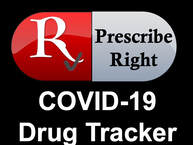|
COVID-19 Vaccines
The U.S. will share its stockpile of the AstraZeneca COVID-19 vaccine with other countries. Up to 60 million doses are expected to be available. In the 23,324 patient, SIREN trial, the Pfizer-BioNTech COVID-19 vaccine was 70% effective 21 days after the first dose and 85% effective seven days after the second dose in British health care professionals. The dominant variant in circulation during the study was the B1.1.7 (U.K.) variant. In Scotland, the second dose of a COVID-19 vaccine is given 12-weeks after the first dose. An analysis of 1,331,993 patients, found the Pfizer-BioNTech COVID-19 vaccine was 91% effective and the AstraZeneca vaccine was 88% effective in preventing hospital admission for COVID-19 28–34 days after vaccination. In patients 80 and older, the vaccines were 88% and 81% effective. Researchers analyzed data from the World Health Organization pharmacovigilance database and identified 0.6% of adverse events with the mRNA COVID-19 vaccines (Pfizer-BioNTech and Moderna) as facial paralysis-related events (e.g., paralysis, paresis, spasms). Most events were linked to the Pfizer-BioNTech vaccine. This compares to 0.5% with other viral vaccines and 0.7% with the influenza vaccines. The researchers concluded that if an association with facial paralysis exists, it would be very low and similar to other viral vaccines. Researchers analyzed data from 417 patients, who were 65 or older and hospitalized with COVID-19 symptoms. 187 patients tested positive for COVID-19, while 230 were negative. When examining the impact of vaccination in preventing COVID-19 infection, efficacy was estimated to be 94% for fully vaccinated patients and 64% for patients that only received the first dose of the Pfizer-BioNTech or Moderna COVID-19 vaccines. COVID-19 Anti-Inflammatories Synairgen announced that in a 28-day, 120 patient, Phase II trial (NCT04385095), only two patients in the placebo group advanced to hospitalization compared to none in the nebulized interferon beta-1a group in high risk, British outpatients with COVID-19. Due to the low incidence of hospitalizations, prevention of progression to severe COVID-19 could not be calculated. An analysis of a small group of patients with severe breathlessness suggested that use of nebulized interferon beta-1a may help patients recover more quickly. When combining all patients who were markedly or severely breathless in both the home treatment cohort and hospital treatment cohort, treatment with nebulized interferon beta-1 increased the likelihood of recovery. COVID-19 Antivirals Roche and Atea Pharmaceuticals are developing AT-527, as an oral antiviral treatment for Covid-19. The therapy works by blocking the viral RNA polymerase enzyme needed for viral replication.
COVID-19 Antibodies Lilly and AbCellera are developing LY-CoV1404, a monoclonal antibody targeting mutated region of the SARS-CoV-2 spike protein. A preclinical study has shown the antibody can neutralize all known variants (B.1.1.7, B.1.351, B.1.427/B.1.429, P.1, and B.1.526). LY-CoV1404 is being evaluated as part of the Phase III, BLAZE 4 trial (NCT04634409) in patients with mild to moderate COVID-19. Comments are closed.
|
Stay informed, subscribe to the Prescribe Right Pharmaceutical Pipeline Tracker
Archives
January 2023
Categories |
Services |
Company |
Support |
© COPYRIGHT 2015. ALL RIGHTS RESERVED.
|


 RSS Feed
RSS Feed